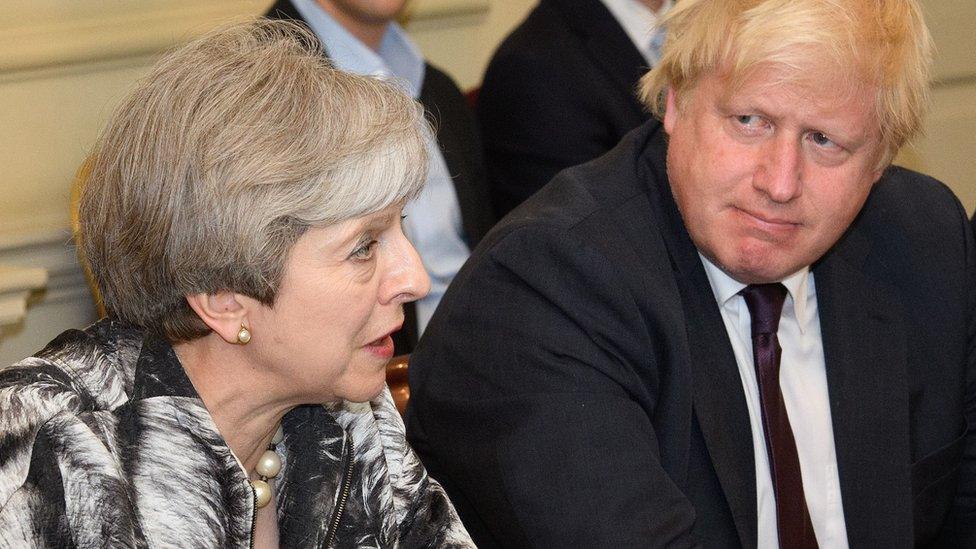Teachers face another year of 1% pay cap
- Published
- comments

Teachers have faced a pay cap for seven years - with pay falling behind inflation
Teachers' pay in England and Wales will have to stay within austerity pay limits - with another year of increases restricted to 1%.
It will mean another real-terms pay cut for more than 500,000 teachers in England and Wales.
The pay review body - which was obliged to keep pay rises to 1% - has expressed its concern.
The cap on pay, initially of 0% and then 1%, has been in place since 2010, as part of austerity measures.
The National Union of Teachers says that successive years of below-inflation pay deals has seen teachers' pay fall in real terms by 13%.
Head teachers' leader Geoff Barton accused ministers of "playing fast and loose with children's education".
"Teachers are facing a seventh year of real-terms pay cuts at a time when we are in a full-blown recruitment crisis," said Mr Barton, leader of the ASCL head teachers' union.
The Department for Education said that it was striking a balance between being fair to teachers and to taxpayers.
Teacher shortages
The decision over teachers' pay will be seen as sending a signal over pay for more than five million public sector workers.
In the wake of the general election, there were reports of debates within the Cabinet about whether to ease the constraints on public sector pay and try to reverse wage stagnation.
The School Teachers' Review Body is an independent pay body that provides recommendations to ministers about the pay of more than 500,000 teachers in England and Wales.
But for the past seven years decisions have been determined by the government's limit on public sector pay.
The review body made its recommendation in line with the limits on public sector pay, but warned ministers of potential problems of teacher shortages and funding pressures.
'Difficult choices'
The pay review body said there was a "real risk that schools will not be able to recruit and retain a workforce of high quality teachers to support pupil achievement".
There is also a warning that schools are "working under increasing financial constraints".
"Between now and 2020, many schools will face both real-terms reductions in the level of per-pupil funding and growing cost pressures. Difficult choices may be inescapable," says the pay body.
The pay limit was part of the government's efforts to reduce the budget deficit following the financial crash.
Russell Hobby, leader of the National Association of Head Teachers, said the outcome was "deeply disappointing".
He criticised that the pay review body "had its hands tied" and could not recommend a pay award "based on the evidence".
Kevin Courtney, leader of the National Union of Teachers, said that after successive years with pay falling behind inflation that some teachers were "finding life very difficult".
"The public sector needs a pay rise," said Mr Courtney.
James Westhead, executive director of Teach First, said that "recruiting teachers is becoming more and more challenging. We need to ensure teaching is fairly rewarded".
The 1% increase will see the overall annual teachers' pay bill for England rise by about £505m to £25.3bn, with the extra cost to come out of the government's existing allocation of funding for schools.
Newly-qualified teachers from the autumn will have a starting salary of almost £23,000, with the upper pay scale for classroom teachers going up to about £38,700. Head teachers' pay will range from £44,500 to over £100,000.
Labour's shadow education secretary Angela Rayner said the government needed to clarify how schools would pay for the increase - or whether it would be "squeezed" from budgets that were already under pressure.
"There are now more questions than answers about their education policy, and schools urgently need some certainty," said Ms Rayner.
Layla Moran, the Liberal Democrat education spokeswoman, said: "Giving teachers another below inflation pay-rise is frankly an insult to these incredibly hard working and dedicated professionals."
A Department of Education spokeswoman said: "We recognise and value the hard work of teachers which is why we have accepted the pay deal proposed by the independent School Teachers' Review Body, in line with the 1% public sector pay policy.
"This will ensure we continue to strike the balance between being fair to public sector workers and fair to taxpayers."
- Published3 July 2017
- Published3 July 2017

- Published4 July 2017

- Published3 July 2017